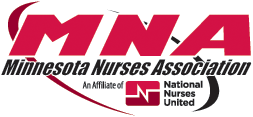By Mathew Keller, RN JD, MNA Regulatory and Policy Nursing Specialist
In early August, Minnesota registered nurse Andy Gladstein had just completed his third week of an online RN to MSN program via Grand Canyon State University in Arizona. Andy had entered the program to further his education in response to national calls for increased nurse education, and he was excited about his progress. Much to his surprise, Andy was suddenly and without warning disenrolled by his university due to the Minnesota Board of Nursing’s old-fashioned views of online education. Because of the Board’s outdated views, Andy’s university was no longer willing to offer its courses to students located in Minnesota. This is not because Minnesota would not recognize his degree, but rather because the Board is treating online education differently than traditional nursing education. Specifically, the MN BoN has adopted a policy requiring online nurse educators accredited and located in other states to obtain their Minnesota nursing licenses before teaching students who may happen to be located in Minnesota. This is in direct contrast to the Board’s view of traditional out-of-state nursing programs, which are required only to be licensed and accredited by their home states in order to train prospective Minnesota residents. The Board’s out-of-touch views are a large barrier to the educational progress of Minnesota nurses and to a field of education that is only growing larger.
 The Board’s views, taken to an extreme, result in some absurd scenarios. For example, Andy could have simply driven across the border to Wisconsin to take his courses. The BoN would then have recognized his education as legitimate. Andy could have taken his courses in person in Arizona. The Board would have also then recognized the education as legitimate. In fact, Andy could have taken his courses in any state in the country, and the Minnesota Board would have recognized his education as legitimate; but in the Board’s view, for Andy to take his courses in Minnesota would have been to place his instructors at risk of practicing nursing “in” Minnesota without a license. The Board’s out-of-touch view begs the question: what about a student enrolled in the traditional RN program at the University of Wisconsin-Eau Claire? If that student were to bring his/her coursework home to Minnesota for the weekend, or view an online lecture in Minnesota while driving through, or email his/her professor a nursing-related question while visiting this state, would that professor be liable for practicing nursing in Minnesota without a license? Using the Board’s logic, the answer would be yes. The BoN fails to understand the distinction between where teaching occurs and where learning occurs: teaching occurs where the instructor is located, and learning occurs where the student is located. To interpret otherwise leads to unreasonable situations such as those faced by Andy Gladstein and others, and draws a distinction between online and traditional education that has no basis in reality. The Board’s views are not in the best interest of students, nurses, patients, citizens, or the state of Minnesota. The Board can and should change its interpretation of where online teaching occurs in order to protect the best interest of Minnesotans. As an advocate for enabling nurses to achieve higher education through all available avenues, MNA recognizes that teaching occurs where the instructor is located, and learning occurs where the student is located. We recommend that the BoN adopt a similar view.
The Board’s views, taken to an extreme, result in some absurd scenarios. For example, Andy could have simply driven across the border to Wisconsin to take his courses. The BoN would then have recognized his education as legitimate. Andy could have taken his courses in person in Arizona. The Board would have also then recognized the education as legitimate. In fact, Andy could have taken his courses in any state in the country, and the Minnesota Board would have recognized his education as legitimate; but in the Board’s view, for Andy to take his courses in Minnesota would have been to place his instructors at risk of practicing nursing “in” Minnesota without a license. The Board’s out-of-touch view begs the question: what about a student enrolled in the traditional RN program at the University of Wisconsin-Eau Claire? If that student were to bring his/her coursework home to Minnesota for the weekend, or view an online lecture in Minnesota while driving through, or email his/her professor a nursing-related question while visiting this state, would that professor be liable for practicing nursing in Minnesota without a license? Using the Board’s logic, the answer would be yes. The BoN fails to understand the distinction between where teaching occurs and where learning occurs: teaching occurs where the instructor is located, and learning occurs where the student is located. To interpret otherwise leads to unreasonable situations such as those faced by Andy Gladstein and others, and draws a distinction between online and traditional education that has no basis in reality. The Board’s views are not in the best interest of students, nurses, patients, citizens, or the state of Minnesota. The Board can and should change its interpretation of where online teaching occurs in order to protect the best interest of Minnesotans. As an advocate for enabling nurses to achieve higher education through all available avenues, MNA recognizes that teaching occurs where the instructor is located, and learning occurs where the student is located. We recommend that the BoN adopt a similar view.



